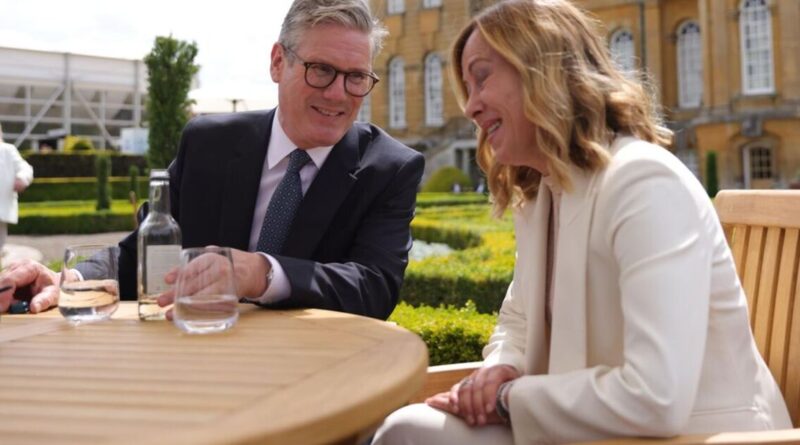Exactly what Italy’s done to slash migrant arrivals | World | News
Sir Keir Starmer is meeting his Italian counterpart Giorgia Meloni in Rome today. The UK’s Prime Minister is certain to have taken careful note of Italy’s dramatic success in cutting the number of migrants landing on its shores by 115,000 in the six months leading up to July.
Despite coming from opposite sides of the political spectrum, the two leaders have a common interest in controlling the influx of migrants, a fact highlighted by a tragic incident over the weekend in which at least eight migrants died off the French coast.
According to figures released by Frontex, the European Union’s border enforcement agency, on August 13, the Central Mediterranean route saw a 64 percent drop in crossings to 32,200.
Italian interior ministry data show the number of irregular migrants reaching Italy by sea so far in 2024 is around two-third lower than in the same period last year, at 44,675 people compared with 125,800 – a drop of more than 80,000.
Nevertheless, the Central Mediterranean remains the most active migratory route to the EU.
This year’s decrease can be attributed mainly to preventive measures by the Tunisian and Libyan authorities to disrupt the activities of smugglers, says Frontex.
Italy struck financial deals with Tunisia and Lybia, where most people heading to Europe depart from, which included patrol vessels for Tunis. The government in Tunisia also received €100m (£84m) in support to small companies and invest in education and renewable energy. Meloni also signed a major gas deal with Libya and Italy is training and equipping the Libyan coastguard.
Moreover, to boost border security and train more members of the local coastguard, the EU paid Tunisia €105m (£88m).
The deals struck by the EU, Italy and these countries have been criticised by Human Rights Watch, which accused the Mediterranean country and the bloc of being “complicit” in crimes carried out against migrants in Libya.
Arrivals from those two countries account for 95 percent of all migrants reported on the Central Mediterranean route.
Sir Keir Starmer today told reporters he was interested in Italy’s strategies for reducing irregular migration and indicating a desire to explore “upstream” efforts to combat criminal smuggling networks.
The PM’s trip is part of his broader effort to rebuild relations with the EU, with migration being a key focus of discussions.
Italy’s approach includes a processing agreement with Albania likened to former Tory PM Rishi Sunak‘s Rwanda scheme, which was recently scrapped by the Labour government.
When asked about the possibility of the UK adopting a similar arrangement to Italy’s Albania deal, Sir Keir said: “I’m here to discuss how we manage unlawful migration. Italy has seen dramatic reductions, and I want to understand the factors behind this success. It appears that significant progress has been made through upstream work in the countries migrants are departing from.”
He added, “I’ve long believed that preventing people from travelling in the first place is one of the most effective ways to address this issue. I’m keen to learn more about these upstream efforts and explore potential schemes as I meet with Prime Minister Meloni this afternoon. We are committed to collaborating on this grave issue of people smuggling.”
Home Secretary Yvette Cooper emphasised that the Italy-Albania deal differs markedly from the Rwanda plan, which was abandoned by Labour upon taking office. She told BBC Breakfast: “The Italian arrangement is distinct.
“It involves processing in Albania under UNHCR oversight to ensure international standards are met. It focuses on expediting decisions and returns for those who arrived from mostly safe countries.”
Ms Cooper outlined four key aspects of Italy’s approach that are of interest to the UK government: the Albania programme, efforts against organised immigration crime, preventive measures in North African countries to stop Mediterranean crossings, and a major returns scheme.
She added: “The Italians are accelerating returns for those without a legal right to stay, a practice we’ve also increased over the summer. It’s crucial to enforce these rules.”
Responding to criticisms of Italy’s migration policy, Ms Cooper noted: “We’ve always worked with governments of different political orientations, especially those of our closest neighbours facing shared challenges. It’s a sensible approach for any government.”
Sir Keir had previously scrapped the Rwanda deportation policy, declaring that there would be “no more gimmicks” in addressing migration.
He and Cooper recently convened a summit to tackle the criminal gangs facilitating small boat crossings of the English Channel, signalling a shift in focus towards addressing organised crime.





